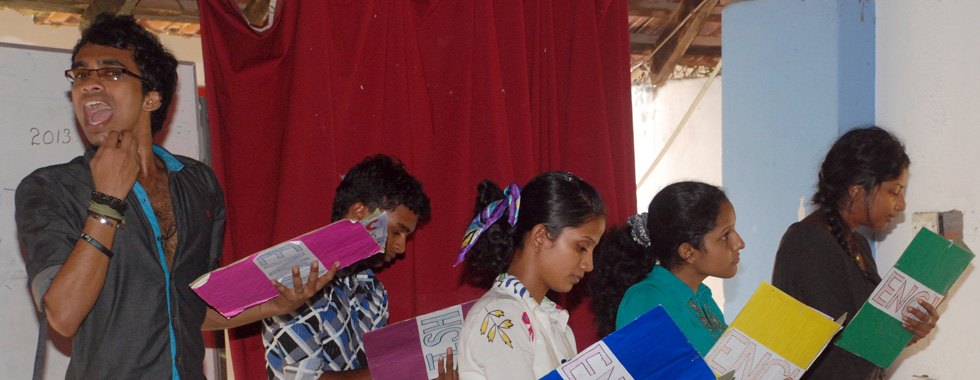A fun-filled lesson
Young students of Dangedara Jayawardena Maha Vidyalaya, Galle get a timely message on mobile devices through a wordless theatrical performance enacted by a team directed by Sulochana Dissanayake, well known puppeteer and founder of Power of Play

Sulochana Dissanayake
The young man’s life is ruled by his phone. He wakes up, washes and picks the shirt he will wear to his English class. Kissing his reflection goodbye, he runs to catch the train, arriving at his tuition class just in time. In the class he dozes off, daydreaming about the girls until his tuition master bellows at him. Back at home he tries three numbers in succession, leaving one person (who he fancifully imagines to be a pretty girl) 20 missed calls. That person turns out to be his tuition master. The boy is mortified. His persistent missed calls never seem to work, somehow.
The young students of Dangedara Jayawardena Maha Vidyalaya had stayed behind after school to see this young man’s story unfold on stage and clearly didn’t regret it one bit. Earlier, before the play began, Sulochana Dissanayake and her team had had a little chat with them. “What are your problems?” they were asked. “As children, what problems do you face every day?” “Speaking English,” one youngster replied. “We have no place to play,” said another. A more pressing concern-“no phone!” came the shout from the back accompanied by a round of hearty laughter.
Sulochana can’t help smiling because it’s actually the opposite scenario she is here to address. The play they were about to see was going to be interesting, she promised. But they had to pay attention very carefully as it was going to be a wordless story.The action on stage didn’t end with a moralistic speech about the evils of mobile devices. Instead, Sulochana’s cast chose to highlight the many uses this same mobile device could be put to instead of making nuisance calls. The cast had slogans ready for the final scene; YouTube addict? Listen to English. On Facebook all day? Then write in English. Stuck on Skype? Speak English. Google junkie? Then learn something while you’re at it. The kids loved it, clapping along and even voicing their agreement.
This enthusiastic reception is what Sulochana and her team have already encountered in Puttalam, Batticaloa and Jaffna over the past few months. With a double major in Theatre and Economics from Bates College in the USA, Sulochana was the recipient of the 2009 Watson Fellowship which she used to study performance traditions in Indonesia and contemporary theatre companies in South Africa. Back at home she has already earned a name for herself as a puppeteer and also directs Power of Play, a company that utilises performing arts as a tool for communication, development and reconciliation. This programme, ‘Shadows of Change’, is an extension of Power of Play’s vision for effective communication with theatre.
It began in 2011 when Sulochana was invited by the American Embassy to direct a performance in Jaffna. “I wondered what I could do that hasn’t already been done,” she remembers. “It had to be relevant. Theatre must always, always be relevant.” Some probing revealed that a major issue for young people in Jaffna was unplanned teenage pregnancy. The short, non-verbal play highlighted this issue-three years later, they returned to Jaffna with the same message.
That first play in 2011 was very well received. Titled ‘Shadows of Change’ the skit relied on the visual techniques of puppets and props- a novel concept for many in the audience. They toured a number of schools in the district earning commendation from school authorities for the use of creative, non-aggressive and thought provoking expression to highlight topics considered taboo by society.
Buoyed by the programme’s success, Sulochana applied for a youth grant given by the US Embassy in 2013 and developed a performance that could be applied to many areas with the same result.
In the task of reaching out to as many young people as possible, she partnered with local organisations Viluthu and Serendipity Trust to expand the project to Puttalam, Batticaloa, Jaffna and Galle. The programme always works the same: Sulochana trains a maximum of 10 young people (most are community actors chosen by the partner organization) for eight days through which they improvise a performance based on the socially critical issues of that area. The focus is on minimal theatre transcending language barriers. “You only need your body and voice to tell a story,” says Sulochana.

No moralising but conveying an effective message: Different scenes of the play (above and below). Pix by M.D. Nissanka
In Galle that’s exactly what the young students of Dangedara witnessed, when the actors brought to life everyday situations through simple mimicry (a train chugging along the countryside, an incessantly ringing phone) and vivid expression.
It’s not just the students who enjoy the freedom of thought and expression. Asked what the teachers thought, Sulochana and her cast received an enthusiastic response. “We thought you communicated the message in a much better way than we would have,” they were told. “It was an important message conveyed in a very organised, timely manner.” More importantly, as the kids and their teachers noted, it was a cue to think for themselves, prompted by the non-verbal form of communication. That’s all Sulochana needs. Thanking them, she advised her young audience to start taking responsibility for their actions. Nodding in agreement, they rushed home to share the story with their families.



